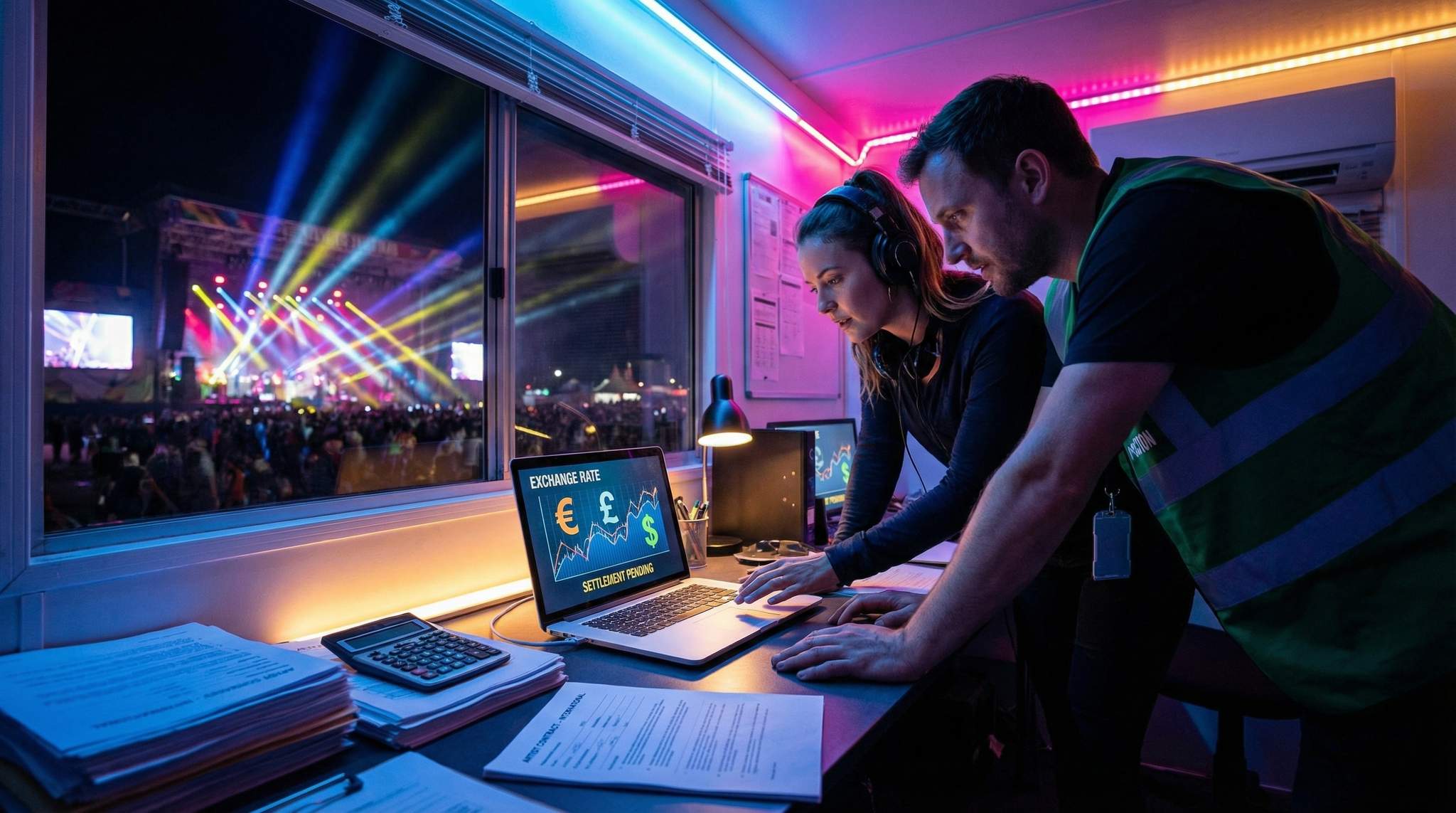International talent is the lifeblood of many destination festivals, but with global performers comes the challenge of settling payments across different currencies. A festival producer needs to ensure that when the music stops and the lights go out, every artist and vendor receives the correct payment smoothly and on time. Handling settlement operations in foreign currencies can be complex – from fluctuating exchange rates to international banking logistics – but meticulous planning and clear agreements can eliminate friction between festival organizers and international talent. This guide offers detailed, practical insights on documentation, rate agreements, and payout rails (payment methods) to help festivals of all sizes navigate post-show settlements effortlessly.
The Challenge of Multi-Currency Settlements
When a festival draws performers and staff from multiple countries, financial complexity rises. Imagine a festival in Mexico paying a European DJ who charges in euros, or an Australian event hosting an American headliner paid in US dollars. If not managed properly, currency differences can lead to misunderstandings, unexpected costs, or delays. Exchange rates can shift between the time you book an artist and the post-show payday – potentially affecting your budget and the artist’s actual earnings when payments are made in foreign currency. In one case, an event company’s profit margin fell from 25% to 20% simply because the currency rate moved unfavorably before settlement, illustrating the risks associated with foreign currency payment structures. For festivals operating on tight margins, such swings can be significant.
Moreover, international banking can be slow and incur hefty fees if you’re unprepared. A wire transfer from a festival’s bank in Singapore to a guitarist’s account in Germany might take several business days, spanning weekends or holidays, unless you’ve planned ahead. Destination festivals – where festival organizers, audiences, and vendors often traverse borders – heighten these challenges. Without a solid strategy, a festival might end on a sour note with artists frustrated over payment issues.
Documentation and Clear Agreements
Smooth settlements start long before the festival – at the contract stage. Every performance agreement or vendor contract should clearly state the currency of payment and the timing (e.g. 50% deposit in advance and 50% after the show). Specify whether the fee is a fixed amount in one currency or an equivalent in another at a set exchange rate. Never leave currency conversion to a last-minute guess. For example, if a Canadian festival signs a UK band for “£5,000 GBP”, the contract should note how that will be paid – will the band receive GBP in their UK account, or will it be converted to Canadian dollars at a pre-agreed rate?
Accept Payments Across 8 Global Markets
Local currency processing in the US, UK, Canada, Australia, New Zealand, India, Indonesia, and Mexico with region-specific payment methods.
In addition to contract terms, gather all necessary documentation ahead of time:
- Payment Details: Collect each international artist’s preferred payment method and banking information well in advance. For bank transfers, obtain the correct IBAN, SWIFT/BIC codes, account number, and bank address as needed. Double-check these details; a single digit off can send a payment into limbo for weeks.
- Tax Forms and Legal Docs: Many countries require specific tax documentation when paying foreign performers. For instance, the United States requires a W-8 BEN form from international artists for tax purposes, and the United Kingdom mandates withholding tax for foreign entertainers beyond a certain earnings threshold. Ensure you understand local laws: you may need to withhold a percentage of the fee for taxes or file paperwork so the artist isn’t double-taxed. Clarify these obligations and include them in contracts so artists aren’t caught by surprise.
- Visas and Permits: If artists are on work visas, they might need proof of payment amounts for immigration compliance. A detailed settlement statement can serve as evidence of earnings to satisfy visa conditions.
- Settlement Sheets: Prepare a standard settlement sheet template to finalize payments after the show. A settlement sheet is a breakdown of all financial details of the performance – it notes the agreed fee, any prepayments (deposits), expenses or deductions (like hospitality or equipment rentals if charged back), and the final balance paid to the artist, a practice recommended by Live Music Office regarding settlement breakdowns and FLI Artists for transparency. Not only do these sheets provide clarity, they’re also invaluable for the artist’s own records. International artists often rely on such documentation to verify earnings for visa applications and tax filings. Providing a proper settlement sheet builds trust and transparency, preventing disputes by clearly outlining the deal’s financial outcome.
By nailing down documentation early – and putting all financial terms in writing – festival organizers create a paper trail that protects both sides. Should any disagreement arise later (for example, an artist questioning a conversion rate or a withheld tax amount), you have the agreed terms and figures on hand.
Planning a Festival?
Ticket Fairy's festival ticketing platform handles multi-day passes, RFID wristbands, and complex festival operations.
Setting Currency and Exchange Rate Agreements
One key decision is deciding which currency to use for each payment. The goal is to shield both the festival and the talent from unnecessary currency risk and confusion:
- Contract in a Stable Currency: Many destination festival producers choose to contract major international artists in widely used currencies like USD or EUR, even if the festival is in another country. Major currencies tend to fluctuate less dramatically against each other, and most artists (or their agents) are comfortable quoting fees in them. For example, a festival in Brazil might agree to pay a US DJ in USD rather than Brazilian Real to give the artist certainty and protect them from exchange volatility in a less stable currency.
- Local vs. Home Currency: Sometimes artists prefer to be paid in their home currency, especially if they’ll ultimately convert the money when it reaches them. Paying a European band in euros even when they play in Asia can make them more comfortable. On the other hand, if your festival revenues are in local currency (like ticket sales in Japanese Yen for a Tokyo festival), converting a large amount to another currency can expose the event team to exchange rate risk. Assess who is better positioned to handle conversion costs – you or the artist. In negotiations, this can even be a point of compromise: an artist may accept a slightly lower fee in their home currency if it means they avoid conversion hassles and uncertainty.
- Exchange Rate Clarity: If you do agree to pay in a different currency than the ticket or sponsor revenue you’re collecting, decide how and when the conversion will be calculated. Lock it down in writing. Common approaches include using the exchange rate on the day of payment or an average rate from a specific source (like a central bank or reputable forex site) on a predetermined date. Some contracts set a fixed exchange rate at signing – essentially hedging the currency within the deal. For instance, an Indian festival might promise an EU artist, “€10,000, converted to Indian Rupees at the ECB (European Central Bank) rate on the first day of the festival.” This way, both parties know roughly what to expect and the artist isn’t at the mercy of last-minute currency swings.
- Hedging for Large Exposures: If your festival has a significant budget tied up in foreign-currency payments, consider financial hedging tools for international deals. Large festivals sometimes work with their banks or use foreign exchange brokers to lock in rates ahead of time. For example, if a New Zealand festival owes a headline artist $100,000 USD in six months, the festival’s bank can help set up a forward contract to lock in today’s NZD-to-USD rate, which would protect you from depreciation. This protects the festival if the New Zealand Dollar falls in value; you won’t need to spend more NZD than planned to get the USD when payment is due. Hedging can cost a small fee, but it buys peace of mind against extreme currency fluctuations. Smaller festivals may not need complex hedges, but they should still monitor exchange rates leading up to the event and budget a buffer for possible rate changes.
The bottom line is to be explicit about currencies in every deal. If an artist is expecting one currency and gets paid in another without prior agreement, friction is almost guaranteed. Avoid vague terms like “equivalent to X USD” without spelling out how that equivalence is calculated. Transparency here steers you clear of post-show arguments such as “This only equals ¥900,000, but we expected ¥950,000.”
Choosing the Right Payout Rails (Payment Methods)
Having the correct paperwork and a fair rate agreement is half the battle – next comes executing the payment. “Payout rails” refers to the channels or methods you use to transfer funds internationally. The right choice can mean the difference between an artist receiving their fee within hours versus weeks. Here are common options and how to leverage them for smooth settlements:
- Bank Wire Transfers: The most prevalent method for large sums. Virtually every professional festival will use electronic bank transfers (SWIFT wires, SEPA in Europe, etc.) to pay international talent. Wires are relatively secure and can handle large amounts, but they require accuracy and can incur fees on both the sending and receiving end. To expedite wires:
- Inform your bank in advance that you will be making international payments once the festival ends. For significant payouts, ensure your account has the necessary permissions or limits to send the required amounts abroad.
- Use local banking networks when available. For example, within the European Union or UK, using the SEPA/IBAN system in euros or GBP is fast and low-cost compared to an international SWIFT transfer. If you’re a US festival paying a supplier in Germany, consider holding some euros in a European bank account or using a service that sends a domestic EU transfer to the recipient – it can arrive in 1-2 days instead of a week.
- Be mindful of bank holidays and weekends. If your festival wraps up on a Sunday in Indonesia, note that banks might not process the transfer until Monday or Tuesday in that region or the recipient’s country. Communicate this to the artist so they know when to expect the funds.
- Cover or split the fees thoughtfully. Nothing irks an artist more than being shortchanged because intermediary banks skimmed off $50 in fees. You can elect to pay the wire fees on your side (many festivals do, as a courtesy). Clearly state in the settlement whether fees were deducted or covered.
- Online Payment Platforms: For smaller payments or quick alternatives, services like PayPal, Wise (previously TransferWise), and Payoneer offer multi-currency transfers. These can be useful for paying freelancers, smaller vendors, or even artists from regions where traditional banking is cumbersome. For instance, if you owe a graphic artist from Mexico $300, a PayPal transfer might be instant compared to setting up a wire. Wise, in particular, allows relatively low-fee transfers at mid-market exchange rates to bank accounts worldwide – it can often deliver funds within one day to major countries. Note: Discuss platform choice with the payee; not everyone uses every service, and fees for the recipient can vary. Also, large headline fees are usually best through banks, not PayPal, to maintain professionalism (and because PayPal has transfer limits and higher fees for big amounts).
- Cash Payments: While generally not recommended for significant fees, cash still has a place in some post-show settlements at destination festivals. In certain countries or remote locales, artists might find it difficult to access international banking quickly, or they may literally be walking away from the stage to the airport. Some festival producers prepare cash (in local currency or USD/EUR) on-site for final payments, especially if it was agreed upon beforehand. For example, a festival in rural India might settle with some traditional performers in cash if they don’t have international bank accounts. Exercise caution with cash: for safety, document every cash payout with a signed receipt, and be aware of local laws (some countries have limits on cash transactions or require documentation for taking large sums across borders). Always confirm the recipient is comfortable handling a large cash sum – often, artists prefer electronic payment for security.
- Alternative & Emerging Methods: The world of payments is evolving. Some events and artist teams are exploring cryptocurrency (like stablecoins pegged to USD) for near-instant global transfers without bank fees. While this is still far from mainstream in festival settlements, it showcases the importance of staying open to new payout solutions. If you do venture into alternatives, ensure both parties understand the risks (e.g., volatility for non-stable crypto) and compliance aspects.
No matter which payout rail you choose, preparation is key. Test the method with a small payment if possible (like sending a $1 test transfer to verify the account) before sending the full amount. Have a backup plan: if a bank transfer fails or bounces due to an error, could you send via an alternate method quickly? Many seasoned festival organizers keep multiple options ready, so an artist isn’t left waiting.
Data-Driven Event Marketing
Track ticket sales, demographics, marketing ROI, and social reach in real time. Exportable reports give you the insights to make smarter decisions.
Smoothing the Post-Show Settlement Process
The festival is over, but the work isn’t done until everyone has been paid correctly. A smooth post-show settlement process is as much about communication and organization as it is about money:
- Set Expectations Early: Don’t wait until the end of the festival to discuss how and when payments will occur. In advance (ideally during contracting or at least during advance preparations with the artist’s tour manager), confirm the settlement process. Will you settle the night of the performance backstage? Or the next morning at the hotel? Will it be via bank transfer the following week? Knowing this, the artist’s team can plan accordingly. International artists, in particular, appreciate clarity since they might be hopping to the next country or have managers back home awaiting the transfer.
- Dedicated Settlement Team: If you’re running a large festival with dozens of acts, designate a settlement team or finance manager who oversees all post-show payments. This person or team should have all contracts, balances due, and payment details on hand. They can be the point of contact for tour managers or vendor representatives at the event. It’s their job to ensure each party signs their settlement sheet and acknowledges the amount due. Having a dedicated team prevents things from falling through the cracks amid the post-event exhaustion.
- On-Site vs. Off-Site Settlement: Determine which settlements must happen on-site (physically at the festival) and which can be done remotely after everyone goes home. Many festivals pay smaller artists their remaining fees in cash or immediate transfer on-site, while larger headliner payments might be handled via wire the next business day due to banking hours. Some agents insist their artist be paid before they leave the venue – so be ready for that if it’s in the contract. For any payments that will occur after the festival, provide the artist/agent with a written confirmation of the amount owed and the payment timeline before they depart. A simple signed note or email stating “Festival XYZ will remit $5,000 USD via bank transfer within 2 business days” can reassure international talent that they won’t be forgotten once they fly home.
- Avoiding Common Pitfalls: Even with all the prep, things can go wrong if not monitored. Keep an eye on currency exchange developments, especially in the final weeks leading to the event. If your festival is in Turkey and paying many vendors in Euros, for example, and the Turkish lira suddenly dips, you might need to rebalance your budget or dip into contingency funds. Likewise, watch out for last-minute changes: an artist might request a different payee (such as their LLC or a booking agency instead of themselves) at the last second – if so, ensure you have the new details and that this won’t violate any tax or legal rules.
- Real-world example: A European festival once nearly delayed paying a Japanese performing arts troupe because the provided bank details were for a personal account subject to transfer limits. The quick fix was arranging two smaller payments over consecutive days. The bigger lesson was to always verify if there are special instructions for certain countries – sometimes, splitting a payment or having an alternate method ready can save everyone stress.
- Frictionless Communication: If an unexpected issue does come up – say a wire is taking longer than usual – proactively communicate with the artist or their management. Provide proof of transfer (like a SWIFT transaction copy) to show the payment is in progress. International artists will be far more patient if they’re kept in the loop, rather than left in the dark. Remember, from the artist’s perspective, they’ve upheld their end by performing; now it’s your responsibility to fulfill the financial promise.
Finally, consider the reputation your festival builds over time. Word travels quickly in the entertainment industry. If your festival develops a reputation for smooth, hassle-free settlements, top talent from Los Angeles to London to Singapore will be eager to work with you. Conversely, if a band leaves feeling short-changed or has to chase you for payment weeks later, industry agents and managers will hear about it and could steer their talent away from your future events. Professionalism in settlements is not just fulfilling a contract – it’s an investment in your network and your festival’s long-term success.
Need Festival Funding?
Get the capital you need to book headliners, secure venues, and scale your festival production.
Frequently Asked Questions
Why do exchange rates matter for destination festival settlements?
Exchange rates significantly impact festival budgets because currency values can shift between the booking date and the final payment. Unfavorable rate movements can erode profit margins, potentially dropping them from 25% to 20% in some cases. Managing this volatility is crucial to ensure artists receive their expected earnings without unexpected costs for the organizer.
What should be included in a festival settlement sheet?
A standard settlement sheet must detail the agreed performance fee, any advance deposits, and specific deductions for expenses like hospitality or equipment rentals. It calculates the final balance due to the artist. This document ensures financial transparency and provides essential proof of earnings for the artist’s tax records and visa compliance.
How can festivals protect against currency fluctuation risks?
Festivals can mitigate currency risk by contracting artists in stable currencies like USD or EUR regardless of the event location. Organizers may also use financial hedging tools, such as forward contracts with banks, to lock in exchange rates ahead of time. This strategy protects the budget from depreciation and ensures payment amounts remain predictable.
What are the best payment methods for international artists?
Electronic bank transfers like SWIFT or SEPA are the standard for large artist fees due to their security and high limits. For smaller payments or freelancers, online platforms like Wise or PayPal offer faster processing and competitive exchange rates. Cash payments are occasionally used for immediate on-site settlement but require strict documentation and receipts.
What documentation is needed to pay foreign performers?
Organizers must collect accurate banking details including IBAN and SWIFT codes, along with tax forms like the US W-8 BEN or UK withholding tax documents. Contracts should clearly state the payment currency and timing. Additionally, a detailed settlement sheet is often required to satisfy immigration conditions for artists on work visas.
How does a dedicated settlement team help destination festivals?
A dedicated settlement team or finance manager oversees all post-show payments to ensure no details are missed during the event’s busy conclusion. They manage contracts, verify balances, and handle on-site cash payments or wire transfers. This focused approach prevents delays and disputes, ensuring international talent is paid correctly and efficiently before leaving the country.





